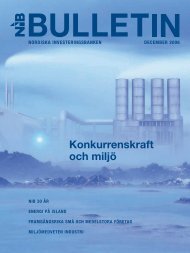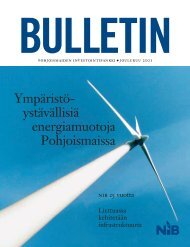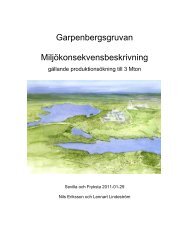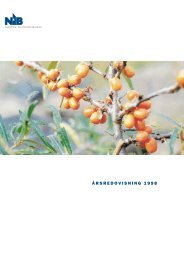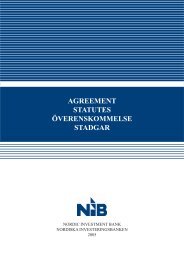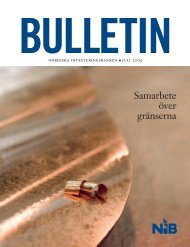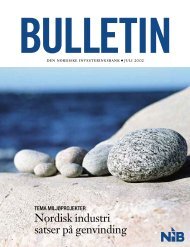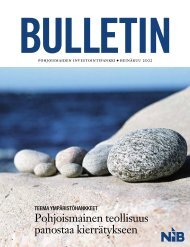BULLETIN
English - Nordic Investment Bank
English - Nordic Investment Bank
- No tags were found...
You also want an ePaper? Increase the reach of your titles
YUMPU automatically turns print PDFs into web optimized ePapers that Google loves.
Kimmo Räisänen<br />
▲<br />
municipal investments, such as for electrical<br />
production networks. Intermediary is a<br />
key word—lending goes via banks to small<br />
enterprises.<br />
Another essential point of departure is<br />
NIB’s healthy capital adequacy. Eriksson<br />
points out that: “Perhaps the demand for<br />
solvency has even been too high. Our<br />
efforts have therefore been to increase the<br />
volume of loans, taking a somewhat greater<br />
risk. We cannot simply let money pile up.”<br />
In relation to NIB’s large volumes and<br />
complex projects, its staff of approximately<br />
140 people is modest. Eriksson comments<br />
on staff size: “If we enter into more complicated<br />
relationships, for example in Russia,<br />
we need to be open to a certain expansion of<br />
the Bank’s personnel.”<br />
What have you been most satisfied with in<br />
your period as chairman?<br />
“That the Bank has actively sought new<br />
paths and that the change in direction has<br />
won a response in the Board and among<br />
the owners.”<br />
A question to be decided as soon as possible<br />
is NIB’s relationship to the Baltic countries.<br />
The conservative group in the Nordic<br />
Council, among others, has proposed that<br />
the Baltic countries be granted membership<br />
in the council.<br />
“An even more natural question, in fact,<br />
concerns Baltic membership in NIB. We<br />
Alongside his responsibilities<br />
in trade and finance,<br />
Bo Göran Eriksson is also<br />
interested in culture.<br />
“I am always reading four or<br />
five books in parallel,” he<br />
explains. The books he was<br />
reading at the time of this<br />
interview included Norman<br />
Mailer’s book on Lee Harvey<br />
Oswald and a book about<br />
Suursaari, an island in the<br />
Gulf of Finland.<br />
» Perhaps the demand for solvency has even been too high. «<br />
are going to come up against this issue<br />
soon, at the latest when the Baltic countries<br />
become members of the EU and the<br />
EIB, which could occur as early as 2004,”<br />
Eriksson points out.<br />
“This brings to the fore in a dramatic way<br />
the question: What is the Nordic region?<br />
Should our starting point be the traditional<br />
notion of what is Nordic, or is it geographic?<br />
Do we view the Balts as relatives or<br />
not?”<br />
This also raises the question of language.<br />
Which language should be used in the<br />
Bank if more countries are involved?<br />
Eriksson replies: “It is also a question that<br />
will surely arise. The question is such that<br />
it should attract interest at the highest<br />
political levels in the Nordic countries. On<br />
a purely technical level, such a broadening<br />
of the Bank’s basis shouldn’t present a big<br />
problem. The Baltic states are so small and<br />
shouldn’t change the financial structure of<br />
the Bank appreciably. So this is essentially a<br />
political question.<br />
“My ‘legacy’ as board chairman could be<br />
to present a challenge: to deal with these<br />
issues in a serious way. Unless the initiative<br />
is taken relatively soon, while the process<br />
towards Baltic membership in the EU is<br />
still ongoing, then perhaps a window for<br />
the Nordic countries will be closed,” Eriksson<br />
concludes. ■<br />
BO GÖRAN ERIKSSON<br />
TRADE POLICY PRO<br />
Bo Göran Eriksson is a lawyer and a<br />
deputy circuit judge, but during more<br />
than 30 years of professional experience<br />
he has been involved foremost<br />
in trade policy assignments.<br />
He studied the subject of European<br />
integration as early as<br />
1966–67 at the European Institute<br />
in Amsterdam. The theme has subsequently<br />
followed him throughout<br />
his career, for example in the trade<br />
departments of the Finnish Ministry<br />
for Foreign Affairs and at EFTA.<br />
As Director General of the trade<br />
department of the Finnish Ministry<br />
of Trade and Industry, Eriksson’s<br />
areas of responsibility include:<br />
European integration, competition<br />
policy and consumer affairs, as well<br />
as tourism and export promotion.<br />
Among Eriksson’s many international<br />
positions, it is worth noting<br />
his membership from 1992 to 1994<br />
in the Finnish delegation in the<br />
negotiations leading up to the<br />
country’s accession to the EU.<br />
Eriksson is also involved in a<br />
variety of ways on the national<br />
level, including as chairman of<br />
the Finnish tourist board.<br />
A task he has prioritised during<br />
the past year concerns a new strategy<br />
for the tourist board.<br />
“New technology is changing the<br />
industry rapidly. The era of travel<br />
brochures will soon be over—their<br />
role will instead be taken over by<br />
call centres and the Internet.<br />
“Search engines on the Internet<br />
don’t function well today for the<br />
average consumer who is searching<br />
for information on travel destinations<br />
and routes. There is a large<br />
need for a uniform European system<br />
for the whole travel sector,”<br />
Eriksson says.<br />
The issue is now being considered<br />
at the highest European level,<br />
by Erkki Liikanen, EU Commissioner<br />
for Enterprise and Information<br />
Society—at Eriksson’s<br />
initiative.<br />
18 bulletin ● july 2002




